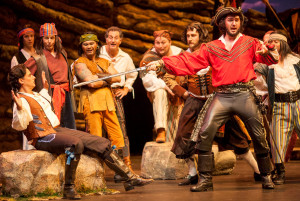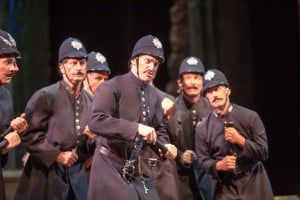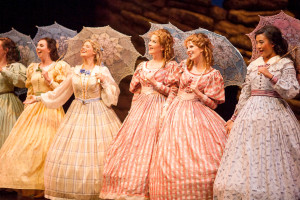
Photo by Charles Martin, 2014.
From Captain Jack Sparrow to Captain Hook, pirates have found their niche in the modern arts. But before “Pirates of the Caribbean” and even before “Peter Pan,” there was “The Pirates of Penzance,” which premiered in New York in 1879 to critical acclaim.
Now, after almost 135 years, the Lamplighters Music Theatre is presenting its interpretation of the classic comedy opera throughout the Bay Area. Having already made stops in Walnut Creek and Mountain View, the show will go to San Francisco on August 14-17 and Livermore on August 23-24.
The Gilbert & Sullivan show follows a young pirate named Frederic (Samuel Faustine) who falls for Mabel (Kaia Richards), the daughter of Major-General Stanley (F. Lawrence Ewing). The Major-General and the Pirate King (Charles Martin) obviously do not get along, as one protects the sea and the other ravages it. Frederic plans to abandon his life of piracy as he is allowed to leave his apprenticeship on his 21st birthday, but he learns that he was born on February 29, which thus creates a loophole.
One issue with the show is that the Leap Day problem isn’t introduced until the final third of the opera. The exposition is quite drawn-out, and the conflict isn’t revealed until the second act.

Photo by Charles Martin, 2014.
Part of the reason why is because of the abundance of songs. The songs were the primary storytelling device, with not much dialogue in the script. Conversations were often recited in song and each actor did a great job of still conveying the emotion behind the words he was saying. Therefore, the actors used their voices well to convey passion as they sung.
The cast also worked very well together. Their chemistry was apparent in their harmonizations, as many of the songs were neither solo nor duet performances, but instead featured multiple performers.
The large number of musical performances was also beneficial, as the standard dialogue was quite mundane and uninspiring. The line delivery was not of a very high standard and really paled in comparison to the excellent vocal performances. The actors’ singing was much more captivating than their talking.

Photo by Charles Martin, 2014.
Another great aspect of the show was the costuming. With a pirate-themed opera from over a century ago, it’s clearly difficult to find the appropriate attire for the cast. But it felt like the same costumes could have been used in a Hollywood film, as the scruffy yet intimidating pirates wore raggedy clothes and the Major-General’s firm and professional outfit matched his social status.
This run of “The Pirates of Penzance” is actually double-casted. The Major-General is one of the only roles which only has one actor. Most of the other main characters have two who alternate. So whether you’ve never seen the show before or have already seen it during the Lamplighters’ run, it’s a different show every time due to the constantly changing cast.
